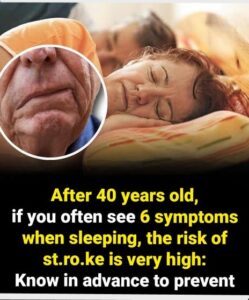After 40, Pay Attention: 6 Nighttime Symptoms That Could Signal a Stroke

For adults over 40, the way your body behaves while you sleep can hold critical clues about your health—especially when it comes to stroke risk. Strokes that strike during the night, often referred to as “wake-up strokes,” are particularly alarming because symptoms may go unnoticed until morning. Spotting these warning signs early can literally mean the difference between life and death.
1. Loud Snoring or Sleep Apnea
Snoring is often brushed off as nothing more than a nuisance, but in some cases, it’s a serious red flag. Obstructive sleep apnea, where breathing repeatedly stops and restarts during sleep, robs the body of oxygen and puts enormous stress on the heart and blood vessels. Over time, this raises blood pressure, fuels inflammation, and significantly boosts the risk of both heart attacks and strokes. If snoring is excessively loud—or if you or your partner notice gasping or choking during the night—it’s crucial to get evaluated by a doctor. Treating sleep apnea can dramatically lower stroke risk.
2. Severe Morning Headaches
Waking up with a pounding, unusual headache isn’t just unpleasant—it may be a warning sign. Unlike common tension or sinus headaches, these sudden and intense pains can point to restricted blood flow in the brain. If headaches are paired with dizziness, weakness, or vision changes, they should be treated as urgent medical issues, not something to “sleep off.”
3. Numbness or Weakness on One Side
Perhaps the most recognized sign of a stroke is waking up unable to move properly on one side of the body. This could affect the face, an arm, or a leg. The FAST method can help you quickly assess the situation:
-
F – Face drooping
-
A – Arm weakness
-
S – Slurred speech
-
T – Time to call emergency services
Even if the weakness eases after a short time, don’t wait—it may still be a stroke in progress.
4. Speech or Cognitive Difficulties
Struggling to form words, speaking unclearly, or appearing confused after waking should always raise red flags. A sudden inability to follow simple instructions may indicate a stroke happened overnight. Because time is the most important factor in recovery, immediate medical help is essential.
5. Sudden Vision Problems
Vision loss, blurriness, or double vision without warning can signal that the brain’s vision-processing areas have been affected. Even if your sight returns quickly, the danger is not over. Visual changes during or after sleep should be treated as potential stroke symptoms and checked right away.
6. Balance and Coordination Issues
Difficulty standing, walking, or controlling movement upon waking can also be linked to a stroke, particularly if the brainstem or cerebellum is involved. Dizziness, unsteadiness, or sudden clumsiness shouldn’t be dismissed as “just getting older.” If these changes come out of nowhere, it’s time to seek urgent care.
The Bottom Line
While strokes can strike at any time, the ones that occur during sleep are especially dangerous. If you notice—or your partner notices—any of these six symptoms, don’t ignore them. Adults over 40, especially those with conditions like high blood pressure, diabetes, or a history of smoking, need to stay extra alert. Acting fast and calling for emergency help can save lives and dramatically improve recovery.